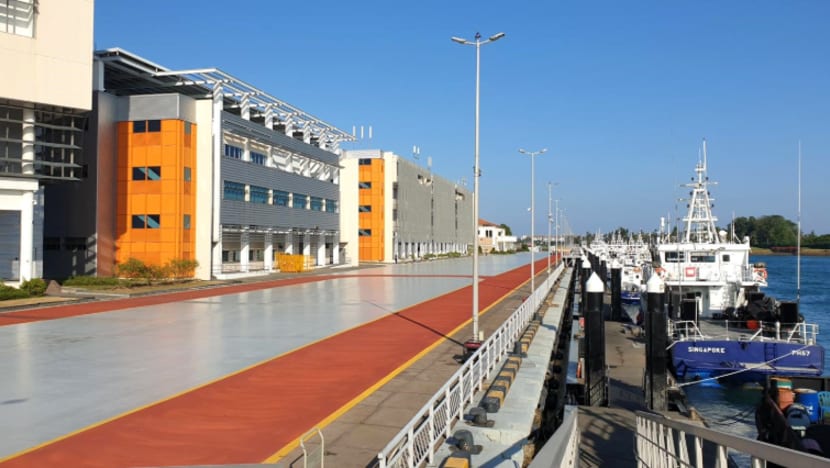Oil leak from damaged fuel hose at Police Coast Guard's Brani base; no oil slicks observed
About 23 tonnes of oil leaked from the damaged hose.

File photo of Police Coast Guard (PCG) Brani Regional Base. (Photo: Facebook/Singapore Police Force, Police Coast Guard)

This audio is generated by an AI tool.
SINGAPORE: About 23 tonnes of oil leaked from a damaged fuel hose at the Police Coast Guard's Brani base, Singapore authorities said in a statement on Thursday (Feb 6).
No oil slicks have been observed, said the Singapore Police Force, Maritime and Port Authority (MPA) and National Environment Agency (NEA) in a joint statement.
The diesel oil leak was discovered at the Brani Regional Base on Wednesday at about 11.40am and eventually isolated at about 3.40pm.
The oil came from a damaged shore fuel hose used to refuel patrol craft at Selat Sengkir.
The Police Coast Guard and MPA deployed patrol craft and "spill response resources" to clean up small patches of light oil sheens seen in Singapore's southern waters.
"Contractors have also been activated to support the operation. There are no oil slicks observed," said the authorities.
Navigational traffic in the area is not affected. There is no impact on operations in the Port of Singapore, they added.
In a separate statement, a Sentosa Development Corporation (SDC) spokesperson said it is aware of the incident.
"Currently, there are no oil sightings or smell at all our beaches, and the waters of Tanjong, Palawan, and Siloso Beach remain open. Guests can continue to use our beaches for water activities."
As a precautionary measure, the spokesperson said SDC has deployed a mix of oil absorbent and deflective booms around the three beaches to safeguard the shores and marine environment.
OIL SPILLS
This is the latest in a series of incidents where oil has spilt or leaked into Singapore’s waters.
Singapore agencies said in December that Shell had shut down an oil processing unit at Pulau Bukom to facilitate investigations into a suspected leak in the system.
It was estimated that “a few tonnes” of refined oil products were leaked, together with cooling water discharge. Oil sheens were later seen alongside a wharf at the facility, with containment and clean-up measures taken.
In June, an oil spill occurred after Netherlands-flagged dredger Vox Maxima hit Singapore-flagged bunker vessel Marine Honour at Pasir Panjang Terminal.
This ruptured one of Marine Honour’s oil cargo tanks, releasing about 400 tonnes of low-sulphur fuel into the sea.
Clean-up operations involved 800 cleaning personnel and 2,300 volunteers, and were completed in September, ahead of schedule.
On Oct 20, about 30 to 40 metric tonnes of "slop" - a mixture of oil and water - leaked from a Shell land-based pipeline into the sea between Bukom Island and Bukom Kecil.
And on Oct 28, an estimated 5 tonnes of oil was reported to have overflowed during bunkering operations between a Bahamas-flagged bulk carrier and a licensed bunker tanker.
The International Tanker Owners Pollution Federation (ITOPF) categorises oil spills of less than 7 tonnes as small.












